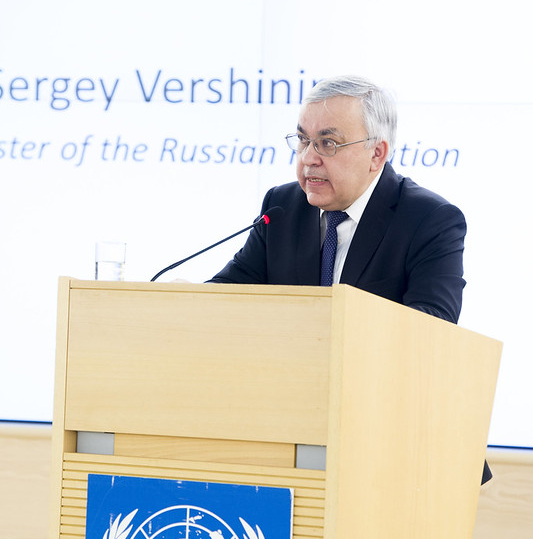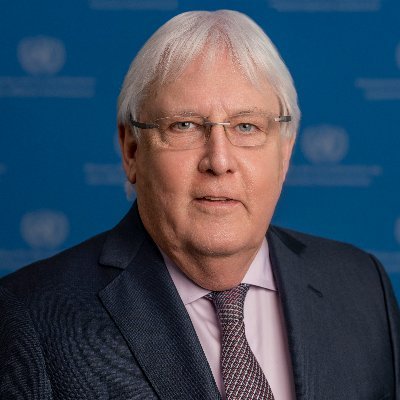Russia has resumed its critiques of the Black Sea Grain Initiative and complaining that the West is not living up to commitments to free up Russia’s ability to export fertilizer, something U.N. officials stress they are trying to facilitate.
The initiative, which is a U.N.-brokered deal between Ukraine, Russia and Turkey that allows for exports of corn, wheat and other ag commodities from Odesa ports, was successfully renewed for another 120 days on Nov. 19, but only after Moscow threatened to scuttle the deal amid demands that restrictions be removed on its fertilizer exports.
Now, Russian complaints that the initiative is only benefiting wealthy nations have resumed. U.N. officials say they are working on the fertilizer issue — especially Moscow’s demands that a controversial ammonia pipeline to Ukraine be reopened.
 Russian Deputy Foreign Minister Sergei Vershinin (U.N. Photo: Violaine Martin)Russian Deputy Foreign Minister Sergei Vershinin says the agreement needs to be altered.
Russian Deputy Foreign Minister Sergei Vershinin (U.N. Photo: Violaine Martin)Russian Deputy Foreign Minister Sergei Vershinin says the agreement needs to be altered.
Vershinin, who has been pushing for months to get a deal to open up the ammonia pipeline that stretches from UralChem’s Togliatti Azot facility in Samara, Russia, to Ukraine’s Port of Yuzhny, complained to Russian media after a meeting with Turkish government officials Monday in Istanbul.
Ukraine’s “grain supplies are still not going to the poorest countries so far,” he told Russia’s Tass news agency. “They are primarily flowing to well-developed and well-off countries. This, in turn, makes us remember how it all began. After all, the four-way deal was reached under the slogan of ensuring food security for the neediest countries of Asia, Africa and Latin America first and foremost.”
It's an argument that has been made before, and the reaction from the United Nations remains the same.
While the U.N. World Food Programme and U.S. Agency for International Development have contracted ships to donate Ukrainian ag commodities to countries like Ethiopia, the bulk of more than 13 million metric tons of corn, wheat and vegetable oil coming out of Odesa ports has been strictly commercial transactions.
While most of those shipments have not been food aid, they have served to lower food prices around the globe, says U.N. spokesman Farhan Haq.
“That in and of itself is tremendous assistance to people around the world,” Haq said during a U.N. press conference Monday.
Spain, Turkey and China were the largest buyers of Ukrainian grain from Aug. 1 through Dec. 1, according to data published by the Ukrainian consulting form APK Inform. Spain imported more than 2.3 million tons from Aug. 1 through Dec. 1. Turkey imported more than 1.7 million, and China took about 1.5 million.
When the initiative was ratified on July 22, a secretive second pact was also signed that pledged to facilitate exports of Russian fertilizer — much of which remains idled at facilities in European ports.
Vershinin, in his comments during the Istanbul meeting, suggested both the Black Sea Grain Initiative and the second deal on Russian fertilizer are connected.
“We believe that as part of the single package, it is absolutely essential to ensure progress in carrying out the second part of the package of the memorandum between Russia and the UN’s secretariat,” he told Russian reporters. “It suggested ensuring uninterrupted access of agriculture products and fertilizers from Russia. So far, we have not received any substantial results.”
 Martin Griffiths, U.N.
Martin Griffiths, U.N.
Two weeks ago, U.N. Under-Secretary-General for Humanitarian Affairs Martin Griffiths was optimistic for a speedy reopening of the ammonia pipeline. Speaking on a panel at a Reuters event on Dec. 1, Griffiths said a deal to restart the pipeline was almost ready.
“I think we’re quite close,” Griffiths said. “We’re edging towards it this week … It’s not difficult. It could be restarted within a week or two.”
Interested in more coverage and insights? Receive a free month of Agri-Pulse!
Georgy Eliseev, a market analyst for S&P Global Commodity Insights, isn't optimistic that Ukraine will agree to turn on the pipeline and ship Russia’s ammonia.
“I think it will not restart or may restart for some days and then switch off again,” Eliseev said. “It’s too dangerous, and the Ukrainians are not at all willing to allow it. Russia continues strikes to damage the Ukrainian electric infrastructure to leave Ukraine without light and heat for the winter.
“But the pipeline needs electricity too, it has compressors and other equipment, it must be guaranteed for safe work,” he added. “It’s hard to imagine that the Ukrainians will sit in cold homes without light, but will provide electricity to the Russian pipeline.”
Before the invasion, Russia accounted for 25% of the global ammonia market, and much of that was shipped through the pipeline to the Yuzhny port in Ukraine. Yuzhny, Odesa and Chernomorsk are the three Ukrainian ports that were freed to export under the Black Sea Grain Initiative.
Meanwhile, most of the Russian fertilizer at European ports at the outset of the Russian invasion of Ukraine remains stranded there. While the EU eventually removed sanctions on the fertilizer itself, European banks will not take money from the Russian companies that shipped the product.
Two weeks ago a ship chartered by WFP loaded 20,000 metric tons of Russian nitrogen, phosphorus and potassium at the Dutch port of Terneuzen for donation to farmers in Malawi. That was made possible because Russia’s Uralchem announced it would donate a total of 260,000 tons stranded in European ports.
It’s not just Moscow’s demands that are spurring the U.N. to free up Russian fertilizer exports. It’s a fear that a shortage of fertilizer on the world market next year will increase food prices.
“In 2022, the world struggled with a price crisis,” the WFP said in a statement. “There was enough food but at the wrong price and in the wrong place, meaning the poor could not afford it. In 2023, there could be a major food-availability crisis as the global fertilizer crunch, climate shocks and conflict upend food production.”
For more news, go to www.Agri-Pulse.com.


